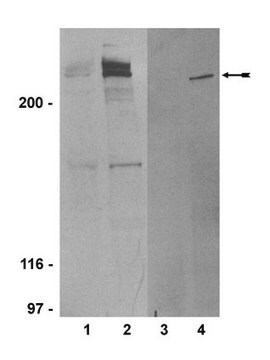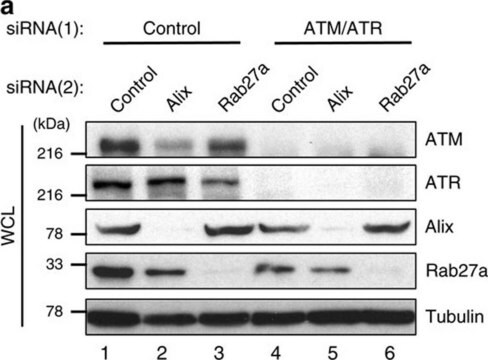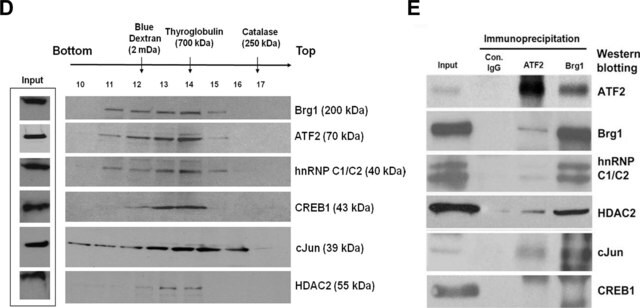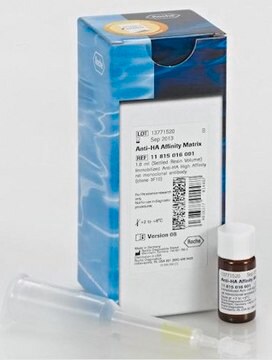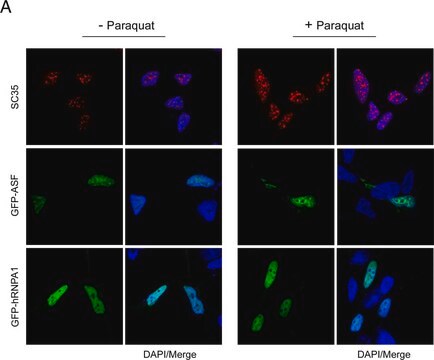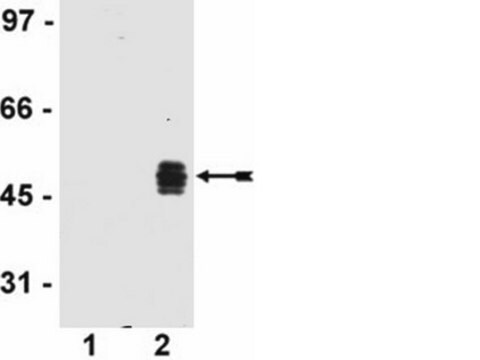MABE241
Anti-dimethyl-phospho Histone H3 (Lys9/27)/(Ser10/28) Antibody, clone 51TA-2H12
ascites fluid, clone 51TA-2H1, from mouse
Synonym(e):
Histone H3.1, Histone H3/a, Histone H3/b, Histone H3/c, Histone H3/d, Histone H3/f, Histone H3/h, Histone H3/I, Histone H3/j, Histone H3/k, Histone H3/l
About This Item
Empfohlene Produkte
Biologische Quelle
mouse
Qualitätsniveau
Antikörperform
ascites fluid
Antikörper-Produkttyp
primary antibodies
Klon
51TA-2H1, monoclonal
Speziesreaktivität
human
Methode(n)
dot blot: suitable
immunocytochemistry: suitable
immunohistochemistry: suitable
immunoprecipitation (IP): suitable
western blot: suitable
Isotyp
IgG1κ
NCBI-Hinterlegungsnummer
UniProt-Hinterlegungsnummer
Versandbedingung
wet ice
Posttranslationale Modifikation Target
phosphorylation (pSer10/pSer28), dimethylation (Lys9/Lys27)
Angaben zum Gen
human ... HIST1H3F(8968)
Allgemeine Beschreibung
Spezifität
Immunogen
Anwendung
Epigenetik & nukleäre Funktionen
Histone
Dot Blot Analysis: A representative lot was used by an independent laboratory in unmodified and modified Histone H3 peptides. (Eberlin, A., et al. (2008). Molecular and Cellular Biology. 28(5):1739–1754.)
Immunocytochemistry Analysis: A representative lot was used by an independent laboratory in NIH/3T3 cells. (Eberlin, A., et al. (2008). Molecular and Cellular Biology. 28(5):1739–1754.)
Immunohistochemistry Analysis: A representative lot was used by an independent laboratory in mouse testis tissue. (Eberlin, A., et al. (2008). Molecular and Cellular Biology. 28(5):1739–1754.)
Immunoprecipitation Analysis: A representative lot was used by an independent laboratory in HeLa cells. (Eberlin, A., et al. (2008). Molecular and Cellular Biology. 28(5):1739–1754.)
Qualität
Western Blot Analysis: A 1:5,000 dilution of this antibody detected Histone H3 on 10 µg of untreated and etoposide acid extract treated HeLa cell lysates.
Zielbeschreibung
Physikalische Form
Lagerung und Haltbarkeit
Handling Recommendations: Upon receipt and prior to removing the cap, centrifuge the vial and gently mix the solution. Aliquot into microcentrifuge tubes and store at -20°C. Avoid repeated freeze/thaw cycles, which may damage IgG and affect product performance.
Hinweis zur Analyse
Untreated and etoposide acid extract treated HeLa cell lysates.
Haftungsausschluss
Sie haben nicht das passende Produkt gefunden?
Probieren Sie unser Produkt-Auswahlhilfe. aus.
Lagerklassenschlüssel
12 - Non Combustible Liquids
WGK
nwg
Flammpunkt (°F)
Not applicable
Flammpunkt (°C)
Not applicable
Analysenzertifikate (COA)
Suchen Sie nach Analysenzertifikate (COA), indem Sie die Lot-/Chargennummer des Produkts eingeben. Lot- und Chargennummern sind auf dem Produktetikett hinter den Wörtern ‘Lot’ oder ‘Batch’ (Lot oder Charge) zu finden.
Besitzen Sie dieses Produkt bereits?
In der Dokumentenbibliothek finden Sie die Dokumentation zu den Produkten, die Sie kürzlich erworben haben.
Unser Team von Wissenschaftlern verfügt über Erfahrung in allen Forschungsbereichen einschließlich Life Science, Materialwissenschaften, chemischer Synthese, Chromatographie, Analytik und vielen mehr..
Setzen Sie sich mit dem technischen Dienst in Verbindung.